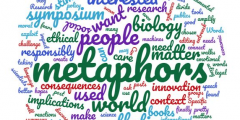New genetics and society: A retrospective
June 7, 2019
I am in a collecting mood at the moment [I have updated this collection/blog post on 17 January 2022 and on 8 October 2024]. When I heard that an article (with Carmen McLeod and Rusi Jaspal) on faecal microbial transplants had finally been accepted by New Genetics and Society, I began to count back and …
Witness marks: On the trail of an epigenetic metaphor
May 17, 2019
This is a guest post by Aleksandra Stelmach, University of Nottingham, Institute for Science and Society In a previous post Brigitte Nerlich and I briefly discussed the emergence of a seemingly new metaphor used in popular discussion about epigenetic effects of nutrition on offspring and, potentially, future generations. In this post I try to track …
Epigenetics in popular culture: The case of turkey dinosaurs
May 16, 2019
This post has been written in collaboration with Aleksandra Stelmach *** On the 5th of May Charlotte Church asked a question in the Guardian that probably many parents ask themselves in these epigenetically informed times: “Will the turkey dinosaurs I ate as a kid affect my children’s health?” On twitter, experts answered that question with …
Science and poetry: Effing the ineffable
April 30, 2019
A couple of weeks ago, Phil Moriarty sent me a poem and a piece of music about (un)certainty ahead of an afternoon of science and poetry on 29 April here at the University of Nottingham. Travelling through cultures This made me think about science and literature, a topic of endless fascination about which countless people …
It’s an icon, it’s a symbol: It’s a polar bear!?
April 19, 2019
A while ago Saffron O’Neill asked me whether one should call polar bear images a climate change synecdoche or a climate change metonym? That was a good question and I should know the answer! Indeed she asked me because she thought I was an expert on that sort of stuff! I have written about metaphors. I …
Science and Metaphors
April 1, 2019
Today I gave a lecture on responsible innovation and responsible language use (via Skype) to biochem and synbio students at the University of Oxford. After the lecture, one student asked whether there was a good go-to book on science and metaphor. I hummed and hawed…. There is of course some stuff, but not a really …
Talking organelles: A riot of metaphors
March 22, 2019
A few days ago, somebody tweeted an article on organelles and somebody else tweeted an article on how worms regenerate their bodies. I was just in a slump of Brexit malaise when I saw this and thought, “oh, there is life outside Brexit at least in worms and cells”. So, I started to read an …
Mice, dice and copycats: Metaphors for gene drives in mammals
February 8, 2019
When you hear the word ‘gene drive’, you will either be baffled or you will think about mosquitoes, engineered to eradicate insect-born disease like malaria, Dengue fever, or Zika for example. But gene drive research has now moved from insects to mammals. Mammals On the 23rd of January, researchers at University of California, San Diego, …
Making Science Public: End of year blog round-up, 2018
December 20, 2018
2018 is the year that the Leverhulme Trust funded programme ‘Making Science Public’ really ended (today our director Sujatha Raman is submitting the final report to the Leverhulme Trust). My last post on the programme, entitled ‘Making Science public: six years on’, mentioned one of the most important milestones of our work, namely the publication with Manchester …
Why we should care about the language we use in science
December 7, 2018
This post first appeared in the ‘On Society’ blog at BioMed Central and is reposted here with permission. *** Brigitte Nerlich and Carmen McLeod at the Synthetic Biology Research Centre at the University of Nottingham have given ‘Responsible Research and Innovation’ a new twist, by focusing on responsible language use. As everybody knows by now, words matter in politics as …
Subscribe by email
About this blog
This blog promotes discussion of topics related to the research programme 'Making Science Public: Challenges and Opportunities'. Our purpose is not to 'make science public'. Instead, we want to study the opportunities that have emerged for science to be more openly practiced and debated, but also the challenges posed by making science public or by promoting the making public of science as a solution to a variety of problems in society and in politics.
This blog will report on these and other issues related to the Leverhulme funded research programme: Making Science Public: Challenges and Opportunities
Useful links
Recent Posts
- Climate change and climate discourse: A dual disintegration
- Erving Goffman: Memories, method and metaphors
- Participation at the core: AI, ELSI and community engagement
- Understanding computational hermeneutics: Making meaning between the past and the present
- AI winter and AI bubble: Historical and metaphorical reflections
 MSP bookmarks
MSP bookmarks
- Twitter May 8, 2017
- Social innovations in Europe #RRI November 3, 2015
- Harvey Graff, the undisciplinarian September 20, 2015
- Replacing Pesticides With Genetics August 31, 2015
- Addressing hazardous chemicals in the circular economy August 25, 2015
Categories
- antibiotics
- anticipatory governance
- artifical intelligence
- big data
- biotechnology
- citizen science
- Climate Change
- Climate Politics
- co-production
- coronavirus
- Creationism
- Definition of Science
- designer babies
- disease
- disease
- engineering
- epigenetics
- Food Security
- Food sovereignty
- gene drive
- genomics
- GM Food
- GMOs
- history of science
- Hype
- images and visualisations
- imaginaries
- Immigration
- Impact
- infectious diseases
- innovation
- interdisciplinarity
- Knowledge Society
- Language
- Markets
- Metaphors
- microbiome
- neoliberalism
- Neuroscience
- open access
- Personal Reflection
- Politics
- Public education
- public engagement with science
- public needs
- public participation
- public policy
- public service
- publics
- regulatory science
- Religion
- Republican Party
- research impact
- responsible innovation
- responsive research
- Richard Dawkins
- risk
- Scepticism
- Science
- Science and Government
- science and politics
- Science and Songs
- Science Communication
- science communication
- Science Fiction
- Science Policy
- Social science
- sociology
- space
- space exploration
- synthetic biology
- transparency
- Trust
- Uncategorized
- Uncertainty
- visualisation
- wonder










